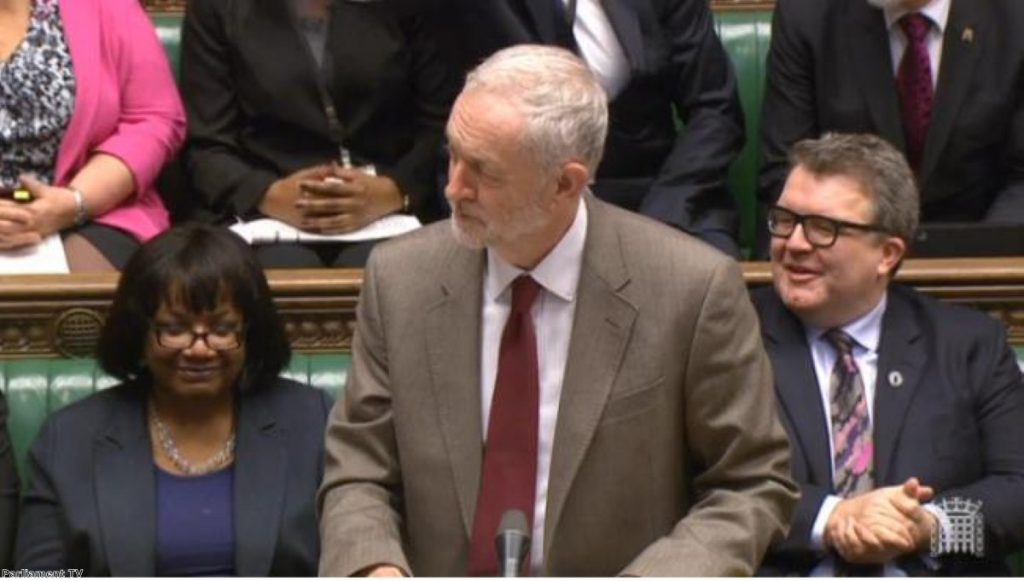For months after Corbyn became leader, his performances at PMQs were uncomfortable to watch. His timing was all wrong, his voice would get louder mid-sentence for no apparent reason and then tail off just as he was saying something important. He was hard to follow and the point he was trying to make was often lost. This wasn't helped by many of his own MPs sitting in stony silence behind him. The only encouragement he received was from members on the opposite side who would cheer every time to stood up, celebrating being handed such a gift of an opposition leader.
The election changed all that. He returned to the Commons with a new energy and confidence. He had more support from his party and the Tories suddenly saw him as a real threat. In recent weeks he has proved that he is learning how to really hurt the government. One of the big criticisms of Corbyn was that he was not providing a real opposition – to anything. He was ineffective and the government was given a green light to do what they wanted. That's no longer the case.
At this week's PMQs, the Labour leader continued to heap pressure on May over Universal Credit. An earlier clash at the dispatch box between the two led to the government making its benefit helplines free. This time, the prime minister struggled to defend why claimants are waiting at least six weeks for their first payment and falling into rent arrears because of the delay. Instead, she used Labour's introduction of tax credits as an attack. The points she made were valid but as a tool to shift attention away from Universal Credit they were useless. The problems with tax credits happened well over a decade ago. People aren't interested in hearing about issues that have long past, they want answers to the problems they face today. May had none.


This came off the back of an emergency debate forced by Labour on the rollout of the new benefit which the Conservatives refused to vote on last week. The Tories insist that they are taking their time and implementing the policy gradually.
This is true. Only eight per cent of claimants currently receive Universal Credit. But already foodbanks are putting out urgent calls for supplies and landlords are warning about tenants falling behind on their rent. What happens when 20% or 40% of people are receiving it? If these problems aren't sorted before then, it will be chaos. Corbyn knows that and May knows it too. The government will have to eventually give in and reduce the initial wait period. It's just a case of when.
While we wait for that inevitable U-turn, the government made another one this week – this time on the housing benefit cap. Ahead of an opposition day debate on the issue, Theresa May confirmed that plans to cap housing benefit payments for both supported housing and social housing tenants would be dropped. Critics of the policy await full details of the change but this was another clear win for Labour.
Corbyn and his team are learning how to spot the government's vulnerabilities and exploit them. There will be plenty more opportunities for this in the coming months. Even without May's ongoing headache caused by Brexit, there are a long list of problems that could quickly turn into a crisis for the government. Last week, several NHS trust bosses spoke out about hospital waiting times with one warning of a "return to 1999". As we head into the winter months, it is not unreasonable to presume we will once again see record numbers of patients waiting on trolleys in corridors.
Then there's the prison service. There have been numerous riots this year and violence levels are at a record high. The government has long been warned that staff shortages and rising prisoner numbers are stretching the service to breaking point. Little has been done to tackle it.
While the government's internal Brexit squabbles dominate the headlines, domestic issues continue to bubble away beneath the service. Corbyn will never be a great orator and his party will continue to have its own splits over Europe, but he is quickly learning how to be an effective opposition. He's thinking on his feet in the Commons and applying pressure on the government where it is most vulnerable. If things continue this way, it will be a long and difficult winter for the prime minister.
Natalie Bloomer is a journalist for Politics.co.uk. You can follow her on Twitter here.
The opinions in politics.co.uk's Comment and Analysis section are those of the author and are no reflection of the views of the website or its owners.









